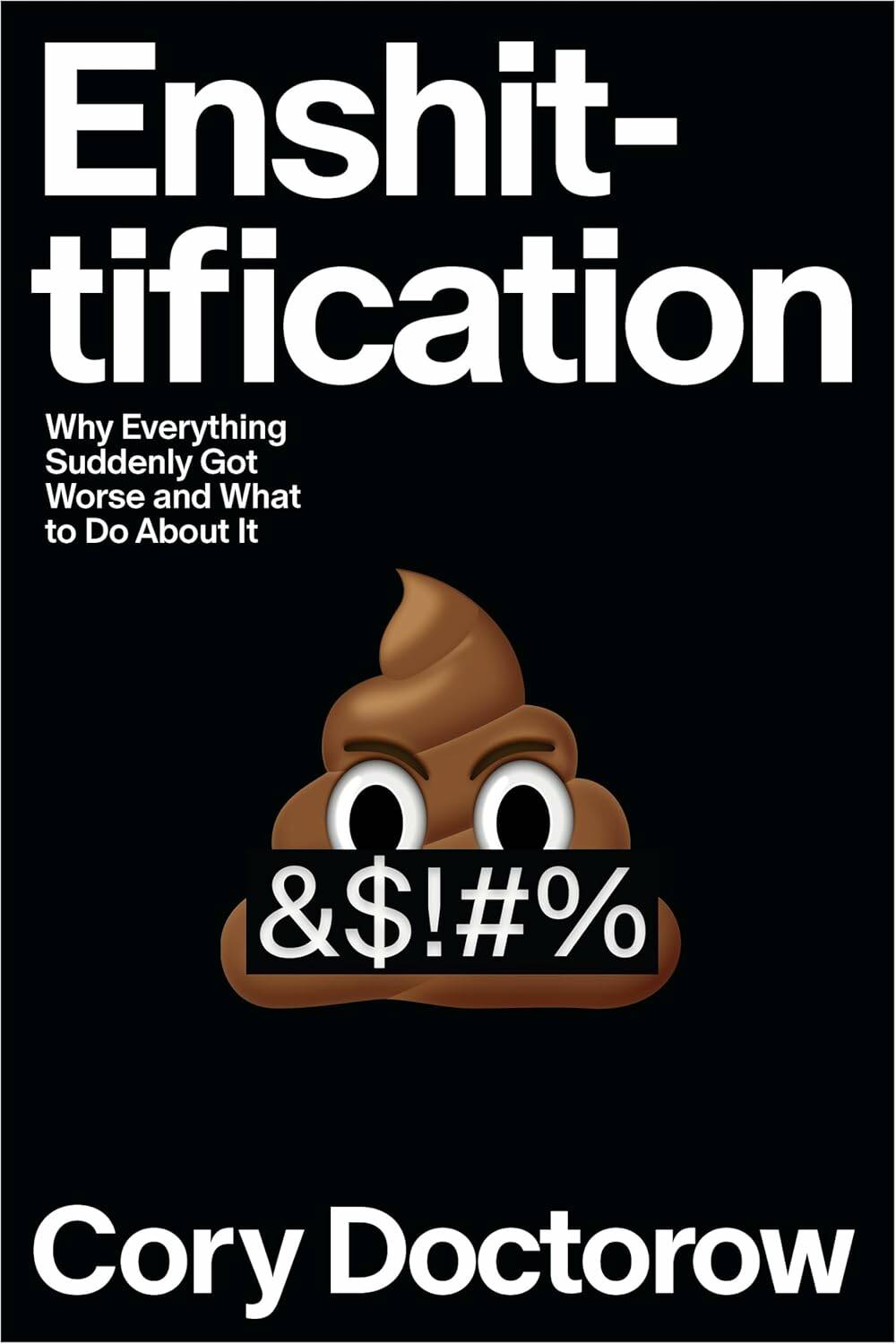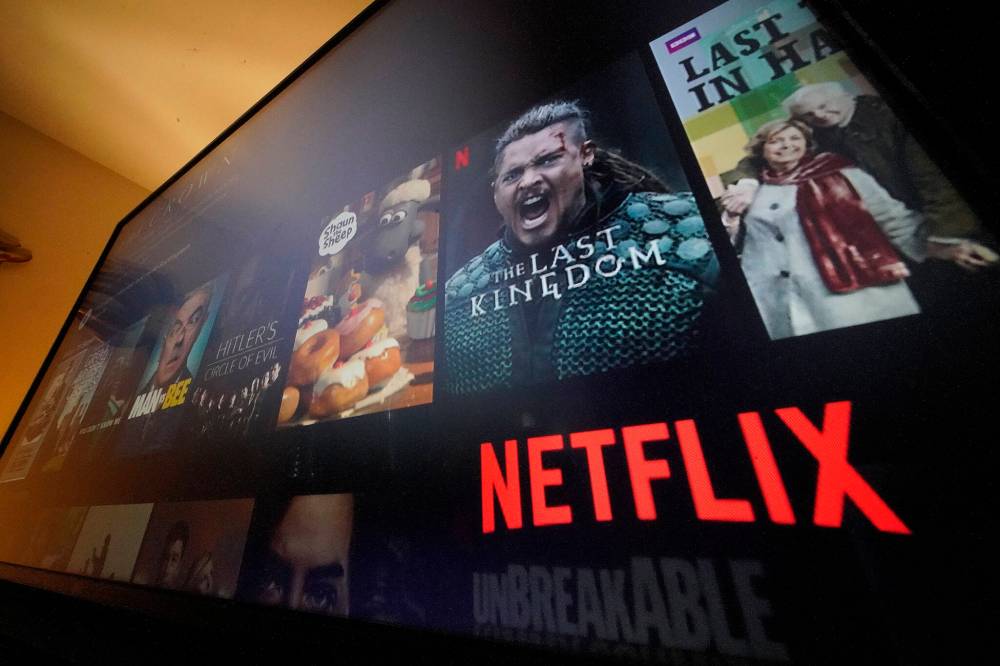Prices hiked, quality spiked
Doctorow documents decline of devices and services as shareholders, tech executives get richer
Advertisement
Read this article for free:
or
Already have an account? Log in here »
To continue reading, please subscribe:
Monthly Digital Subscription
$0 for the first 4 weeks*
- Enjoy unlimited reading on winnipegfreepress.com
- Read the E-Edition, our digital replica newspaper
- Access News Break, our award-winning app
- Play interactive puzzles
*No charge for 4 weeks then price increases to the regular rate of $19.00 plus GST every four weeks. Offer available to new and qualified returning subscribers only. Cancel any time.
Monthly Digital Subscription
$4.75/week*
- Enjoy unlimited reading on winnipegfreepress.com
- Read the E-Edition, our digital replica newspaper
- Access News Break, our award-winning app
- Play interactive puzzles
*Billed as $19 plus GST every four weeks. Cancel any time.
To continue reading, please subscribe:
Add Free Press access to your Brandon Sun subscription for only an additional
$1 for the first 4 weeks*
*Your next subscription payment will increase by $1.00 and you will be charged $16.99 plus GST for four weeks. After four weeks, your payment will increase to $23.99 plus GST every four weeks.
Read unlimited articles for free today:
or
Already have an account? Log in here »
When Cory Doctorow published his 2019 novella collection Radicalized, he had no idea that the title story, of grieving men launching terrorist attacks against a predatory health insurance system that killed their loved ones, would come true with the 2024 UnitedHealthcare shooting. But it’s not the only prediction the Toronto ex-pat got right — in another story, Unauthorized Bread, Doctorow also predicted one of the most irritating and exploitative trends in the tech industry.
In a tale as old as time, a frustrated woman needs to hack her smart toaster, because it’s been programmed to only turn on its heating elements when it detects bread slices with toaster company branding. It’s a clever story conceit, taking aim at printer companies who make their real money off of the ink cartridges they sell, and push firmware updates to block the use of low-priced third-party or refilled ink cartridges.
This reviewer is guilty of enjoying the story while not remotely expecting the practice to ever extend beyond printers. But as usual, Doctorow has his finger on the pulse, and in 2025 it seems that almost everything you used to be able to buy outright is now available exclusively as an exploitative subscription model. From Nintendo’s old 1990s videogames to critical workplace software such as Adobe Photoshop and Microsoft Office, it is no longer possible to purchase a physical device or software disc and use it until either the device fails or a newer edition is good enough to entice the purchaser to upgrade. And with a subscription model, if the monthly fee goes up or the product is worsened in some way, consumers have limited recourse.

Jonathan Worth photo
Cory Doctorow
That’s just one example. Doctorow has much more to say about “enshittification,” his main bugbear of the last couple of years. Doctorow coined the term, which won the American Dialect Society’s word of the year in 2023.
Broadly speaking, computer technology products get enshittified when a company is no longer able to add new customers — so they start working out ways to extract more money from their existing customers, often ruining their products in the process.
Beyond smartphones and computers, the trend of worsening products also applies to such things as televisions, kitchen appliances and even vehicles. Though these have not traditionally carried microchips or internet connections, today’s models are usually “smart.”
Now companies are able to extract ongoing fees for the continued functioning of the products you purchase — say, advanced driving features on a new SUV. Where there is no ongoing fee revenue, having the company’s fingers in the devices consumers bring home is still a problem. The companies may decide it’s not worth supporting a product’s software with required updates or by maintaining servers. If so, the device becomes unusable and purchasers are forced to buy a new one.
Enshittification also applies to things most people do not directly pay for. The simple act of Googling is noticeably worse than it was just a handful of years ago. Company communications released as part of an anti-trust case show that executives voted to adjust the algorithm to make search results less useful. Worse results means searching multiple times and loading more ads.

Enshittification
As a consumer, it feels as if a contract has been broken. Yes, tech executives and shareholders always made obscene amounts of money. But they made good products that we loved, so everyone benefited.
This no longer seems true. Paid streaming services are now inundated with ads. Social media platforms are increasingly unusable as platforms mess with user feeds and get in the way of users and the people they follow. Facebook is now a wasteland of bad sponsored content; it has never been harder to find pictures of your cousin’s new baby.
It seems counterintuitive. How can companies make worse products and still be financially successful? There are technical reasons unique to the industry: companies have access to a vast amount of (often illegally collected) personal data, so consumers are at a huge disadvantage in information warfare terms; companies can also “fiddle” back-end software on platforms to manipulate their user bases in real-time.
But Doctorow explains that there has also been an enormous shift in the balance of power towards the largest companies and away from government regulators, consumer power and smaller-market competitors. The big players’ increased financial resources and political influence has allowed them to get away with providing less value and more irritation at ballooning rates.
Consumers aren’t the only victims; workers have also suffered. Software engineering jobs have become measurable worse, while non-technical employees such as Amazon warehouse workers and Uber drivers have been suffering inhumane conditions for a decade or more. It’s also a rough time for small business owners and entrepreneurs looking to break into the near-monopolized marketplace. Not for nothing was the dais at President Trump’s January 2025 inauguration ringed by a who’s who of established tech company billionaires, all eager to press the little people under their thumb.

Associated Press files
Most subscription streaming services users pay for, such as Netflix, have introduced ads to their platforms in recent years.
It’s a great time to run a tech company and a terrible time for everybody else. Unless, of course, all those little people push back.
Doctorow’s latest is enlightening, incensing and just slightly encouraging. Consider this your one non-fiction must-read of 2025.
Joel Boyce is a Winnipeg writer and educator, and does not want to connect with you on Facebook.



